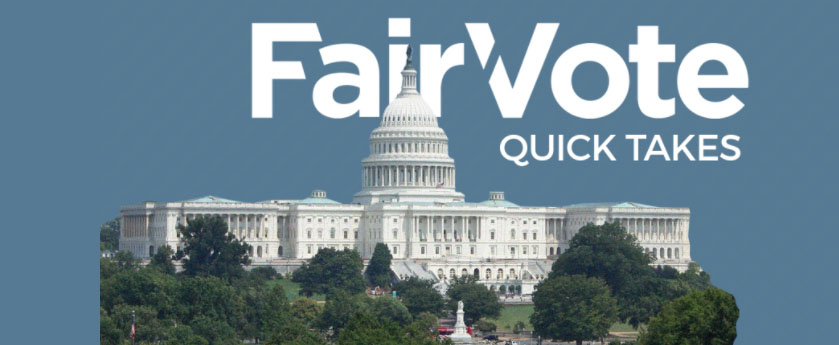||| BEN CHAPMAN for FAIRVOTE WASHINGTON |||
San Juan County, WA — With about half of the votes reported, San Juan County Proposition 3 for ranked-choice voting is trailing by 1,000 votes.
Read the full statement from FairVote Washington Managing Director Stephanie Houghton below:
It’s clear that many San Juan Islanders are ready for ranked-choice voting. Our campaign is hopeful about the results and we’ll be watching closely as more ballots are counted. I’m so incredibly proud of the campaigns we ran across Washington. Tonight, there are hundreds of volunteers, donors, and supporters in Seattle, San Juan and Clark Counties bound by the idea that we can work together to improve our democracy.
They believe in democracy in a time that faith in our democratic institutions is crumbling. They know, like we all do, that the idea that democracy is working just fine is preposterous. People in every corner of Washington know that things could be better, and because of what they’re seeing around the country, are coalescing around Ranked Choice Voting as the clear next step in improving our democracy.
Many San Juan Islanders are ready for ranked-choice voting, but we still have some work to do. We’re looking forward to continuing to build our movement in San Juan County and working with the legislature to open up even more opportunities for better elections.
Win, lose, or draw, we always knew tonight was always going to be only the next step in a long march towards a truly reflective and equitable democracy. We’ll be taking this momentum to the legislature. Our work isn’t over until voters can elect candidates who are responsive to all constituents, who prioritize issues over ideology, policy over politics.
**If you are reading theOrcasonian for free, thank your fellow islanders. If you would like to support theOrcasonian CLICK HERE to set your modestly-priced, voluntary subscription. Otherwise, no worries; we’re happy to share with you.**








With more than 88% of the ballots counted, San Juan County (SJC) voters have rejected Proposition 3 by 57% to 43%. Even if all 950 ballots remaining to be counted were cast in favor of the proposition, it would still lose. (A similar proposition in Clark County is also losing with 58% of the voters opposed.)
The proposed amendment to our Charter to enshrine Ranked Choice Voting (RCV), if and as approved by the State of Washington, could have only affected how we vote for our Sheriff, Treasurer, Clerk, Auditor, and Legislative Body (County Council). RCV affects an election’s outcome only if there are three or more candidates for an office. Many of the attractive-sounding claims of RCV proponents are unsupported by empirical evidence or rational argument. For example, a last-minute flyer sent to voters’ homes by FairVote Washington contained some misleading information and made the claim that RCV “Limits Divisiveness.” Recent academic research (https://www.buffalo.edu/news/tipsheets/2020/001.html ) concludes that the opposite could be true (“RCV is a system that generally enables divisiveness”). Alaska is a recent example of this effect (https://thehill.com/opinion/campaign/3711206-the-flaw-in-ranked-choice-voting-rewarding-extremists/ which includes the assertion that RCV is inherently flawed by an extremist bias).
All voting schemes are flawed in that they can have outcomes that violate at least one of several logically and emotionally desirable traits. The question for an electorate such as San Juan County, is which scheme is most appropriate for them. I believe that the voters of SJC have demonstrated democracy in action by rejecting Proposition 3. I also believe that we should strive to “improve our democracy” and, more urgently, to prevent democratic backsliding. Enacting RCV is unlikely to do that.
I’m surprised and shocked at how many “no” votes this got, and from which demographic – I paid attention to which fences had the big “no” signs on them for Prop 3.. The fact that our own commissioners sat on these propositions until past the deadline (thanks to the two brave ladies who filed suit and got our charter props back on the ballot where they belong) should speak volumes in itself, if people would pay attention.
We have to keep fighting for the right to get more decisions about government back into the hands of the people. Ranked choice voting would also encourage more third party candidates to run. Who knows? Someday we may break the republican/democrat gridlock, which is, I guess, what so many seem to fear. The fact that we can vote for the best individuals for the job, rather than (corrupt) two- party politics, should appeal to everyone with commonsense. Please keep on with this; don’t give up even if we lose this round. Know that many are behind this, and the numbers are growing. Perseverance and commitment will pay in the long run. Never give up trying to wrest some form of democracy back from autocratic control.
I guess Bill Bangs has some points. Maybe this didn’t go far enough in including all elections, including primaries – our one chance to effect something across party lines, considering that the majority of us are independents and claim no allegiance to either party that exists today. But that would mean good people have to run; incorruptible people who can work with all people. Those are rare. And that would mean that at least 3 people would need to run for every position – no more uncontested races unless we have strong write-in candidates who still need to file before the deadline for that.
BIll Bangs: I lived much of my life in Alaska and I am here to tell you that in the last election that used ranked voting, for the person to replace our recently deceased House representative, the most extreme candidates lost out to a moderate. And the in the election held this week, this same moderate seems to be headed toward winning a full term. The Senate is still out but the moderate incumbent is very close to the MAGA candidate in vote totals and some of the villages have yet to have results tabulated and in the past they have been solidly behind the moderate incumbent. Sarah Palin was given a decisive heave-ho, which well might not have happened if we only had one candidate from each of the major parties running. The authors of The Hill article do not know what they are talking about—if they were correct, the Republicans would have loved to keep ranked voting instead of screaming that it is unfair to them (meaning their selected MAGA candidates).
Alaska is using a top-four primary followed by an RCV final. (Washington uses a top-two primary so RCV doesn’t apply.) This year’s Senate and House races in Alaska are both wonderful examples of the pros and cons of RCV. As usual, who supports or opposes any given voting scheme depends on whose ox is being gored in any given election.
The Alaska Senate race should be an excellent example of how RCV can work towards moderation as well as providing an “instant” runoff. The first-ranked votes put Trump-endorsed Kelly Tshibaka in the lead with Lisa Murkowski trailing by 3,000 votes. Had Alaska been using the old plurality system, Tshibaka would have already been declared the winner. But with RCV, and assuming that most of Pat Chesbro’s second-ranked votes go to Murkowski, Murkowski should be declared the winner on Nov. 23. (And you can just imagine the howls from the MAGA crowd.)
In the Alaska House race, Sarah Palin would have been defeated if the final election had been old-fashioned plurality voting and the current leader, Mary Peltola, would be declared the winner. Under RCV, it is still possible for Palin to win (if she receives almost all of all of Nick Begich’s second-ranked votes). More likely, Pelota will receive enough of Begich’s votes to win (but we need to wait until Nov. 23 to find out). But what the Hill article pointed out was that Begich is actually the consensus candidate (see also: https://www.allsides.com/blog/consensus-voting-shows-voters-preferred-nick-begich-alaskas-special-election) and beats each of the other candidates in head-to-head competition. In the primary, Begich was ranked first or second on over 94% of the ballots. RCV will eliminate Begich even though he was preferred over Pelota by 52.5% to 47.5%. While plurality voting is deeply flawed, RCV is no panacea.
My apologies for mis-typing Mary Peltola’s name. (https://www.marypeltola.com/)